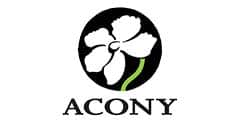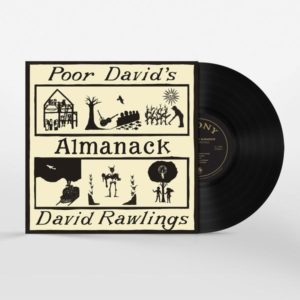Marketplace
2017 Acony Records PRESSING
- Catalog Number Acny-1713LP
- Release Year 2017
- Vinyl Mastering Engineer Stephen Marcussen
- Pressing Weight 180g
- Jacket Style Single
- 100% Analog Mastering Yes
Fun is what immediately springs to mind when listening to Poor David’s Almanack. The Coen Brothers-style parable “Money Is the Meat in the Coconut” sets a banjo-driven, jovial tone for the album’s quirky ride while Rawlings’ contrapuntal guitar lines and layered production help distinguish the record from run-of-the mill Americana rehash. The mood occasionally turns more serious but never maudlin. Poor David’s Almanack’s melodies and charm echo long after the album concludes.
Witness “Yup,” an intimate, front-porch-style fiddle-and-guitar duet that belies the feisty tale about a farmer’s wife who manages to beat the devil and everybody else. Rawlings’ easygoing, conversational delivery—along with the trippy sounds of a musical saw—make the tune all the more amusing. The album’s closer (“Put ‘Em Up Solid”) lays out the fundamentals of building something that will last. Tight bluegrass harmonies, a simple albeit mesmerizing arrangement, and an infectious chorus dovetail with the writer’s sage advice.
On “Airplane,” Rawlings uses a cinematic string arrangement to elevate the song’s poignant portrait of a man struggling to free himself from a failing relationship. In that Rawlings borrows a few structures from traditional folk, a distinct string-band feel washes over the material.But the musicianship proves flashier than that on the old recordings that inspired some of the tracks. Rawlings’ reedy voice also remains at the fore and is frequently backed by the Appalachian-flavored vocals of Old Crow Medicine Show alumnus Willie Watson as well as Gillian Welch, who co-wrote half of the songs here.
Poor David’s Almanack was recorded directly to analog tape by longtime engineers Ken Scott and Matt Andrews in a week-long marathon. Sonics on certain tracks (“Cumberland Gap”) possess a warm, cottony quality given extra snap and energy by the loping drum and bass work of Dawes’ Griffin Goldsmith and Punch Brothers’ Paul Kowert, respectively. The organ fills of Griffin’s brother, Taylor, provide added texture and spice.
Prompted by a desire to do analog to their specifications, Rawlings and Welch purchased a customized vinyl lathe, cut their own lacquers, and turned their recording process into an all-analog operation. Poor David’s Almanack is their label’s second release but lacks the same utter transparency of their imprint’s first album—a reissue of Welch’s The Harrow and the Harvest.
Mastered by Stephen Marcussen and pressed on quiet, flat discs, Poor David’s Almanack has vocal-chorus swells that sound muddy when compared to the nuances heard on the digital copy. Bass notes on the digital edition are also considerably punchier. I’ve compared the versions on several systems and the results are the same: Some important details get lost on the vinyl release. The murkiness seems more pronounced on inner tracks.
Visually, the Welch-designed cover art exudes a textured, bespoke quality that suits the music. Puzzlingly, Acony used bare card stock sleeves instead of the nylon-lined ones included in The Harrow and the Harvest.
Poor David’s Almanack


 4
4